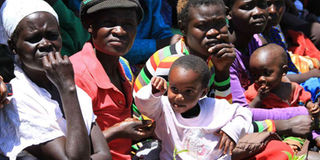Tale of bitter-sweet relations between Patel dam victims and farm

Residents of Energy village, Solai, on May 12, 2018 reflect on the damage caused after Patel dam burst its banks, destroying their village. PHOTO | JEFF ANGOTE | NATION MEDIA GROUP
What you need to know:
- MP Kinuthia Gachobe said residents raised the alarm over the diversion of rivers and that he had sought to meet with the owners of the farm.
- Former area MP Koigi wa Wamwere said he had a big fight with Mr Mansukul when he represented the area in Parliament.
Almost everyone directly affected by the Wednesday night dam disaster in Solai, Nakuru County, has been involved with the Patel Farm, a franchise with a bitter-sweet relationship with locals.
Mr Phares Mwangi, a carpenter whose workshop was swept away after the Patel dam burst its banks, was born on the farm when his parents worked there.
Mr David Aripoi, whose house was uprooted and crushed to smithereens, was once a guard at the farm.
The 30-year-old is now one of the 312 homeless survivors of the tragedy, camping at Solai Boys’ High School.
WAGES
He is camping at the school alongside Mr Willie Mutai, 44, who was once a clerk and a storekeeper at the farm.
The homeless also include 40-year-old Ruth Wangui, who is an employee at the farm.
The area that was first hit by the raging waters was Energy village, where the average monthly rent was Sh800.
A number of workers at the farm lived there and it is easy to tell why. Most workers earned Sh270 for a day of work between 7am and 3pm.
The Sh270 could be computed and remitted twice a month: Mid month and at the end of the month.
DEBTS
Mr John Kariuki, a shopkeeper who served most of the houses destroyed, said these were not rich people.
“They are average earners. They rely on the farm’s owner,” he said.
Most of them, he said, used to survive on debts. “I gave them goods and they would pay back whenever they got money. My book of debts is even full,” Mr Kariuki said.
After the disaster, the mass of brick-walled houses inhabited by the workers who lived alongside casuals working in other areas, was wiped away like a rubber would erase a pencil-drawn section of a diagram.
Even the flesh-cutting wire that had been installed to demarcate the expansive Patel Farm could not withstand the pressures of the water, and bits of it were still on the ground on Saturday.
DISMISSAL
It was a time to look back at the relations the farm’s managers had with the residents.
Mr Aripoi said the arbitrary sackings of staff at the behest of seniors working under the farm’s management discouraged him.
Once a person was dismissed from the farm, Mr Aripoi said, he would be required to vacate his house that same day and would leave with a severance pay of Sh15,000.
And the reasons for dismissal, he said, would include missing work for two days.
Mr Aripoi said the farm owner, Patel Mansukul, ran it jointly with his son, whom the workers call Peri.
Mr Mutai said: “Peri and Patel are good with workers but there are Africans working under them.”
LEADERS
As survivors sought to get back to their normal lives on Saturday, questions were emerging on whether the local leadership had lived up to the residents’ expectations by failing to check against the actions of the farm’s administrators especially on the management of rivers.
Area MP Kinuthia Gachobe admitted that the leadership may have contributed to the disaster, but laid blame on his predecessors.
He came to power during last year’s General Election.
“The previous leadership failed residents. We took over last year and for such a development, there is public participation,” Mr Gachobe said.
“I don’t know whether the owner involved the locals.”
RIVERS
During a public forum in January, the MP said residents raised the alarm over the diversion of rivers and that he had sought to meet with the owners of the farm.
“I was trying to look for an appointment with the owner, but he has been out of the country,” he said.
Former area MP Koigi wa Wamwere, in a statement issued Saturday, said he “had a big fight” with Mr Mansukul when he represented the area in Parliament.
“(I was) trying to stop him from constructing private dams on public rivers because he was denying his neighbours and my voters water,” he said.
“For saying ‘no’ to this private greed, many called me a troublemaker.”
PRIVATE DAMS
Mr Wamwere said the blame lies with those who approved the construction of the dams.
“Two entities are to blame – farmer Patel and corrupt government officers who protected him in all his misdeeds,” he said.
Area MCA Peter Mbae said the Water Resources Management Authority (Warma) should shoulder the biggest blame.
“We want to know what Warma did. You cannot say an individual refused to comply,” he said.
He said Kabazi River is supposed to go all the way down, but with the dam built along the river, it was impossible for this to happen.
“We can only get what Patel wants us to get downstream,” Dr Mbae told the Sunday Nation.
“But now we have opened the entire thing, the whole valve, and within the next three days, it should be done and then the bulldozer should come and make sure the river goes back to its normal course without that dam there.”






